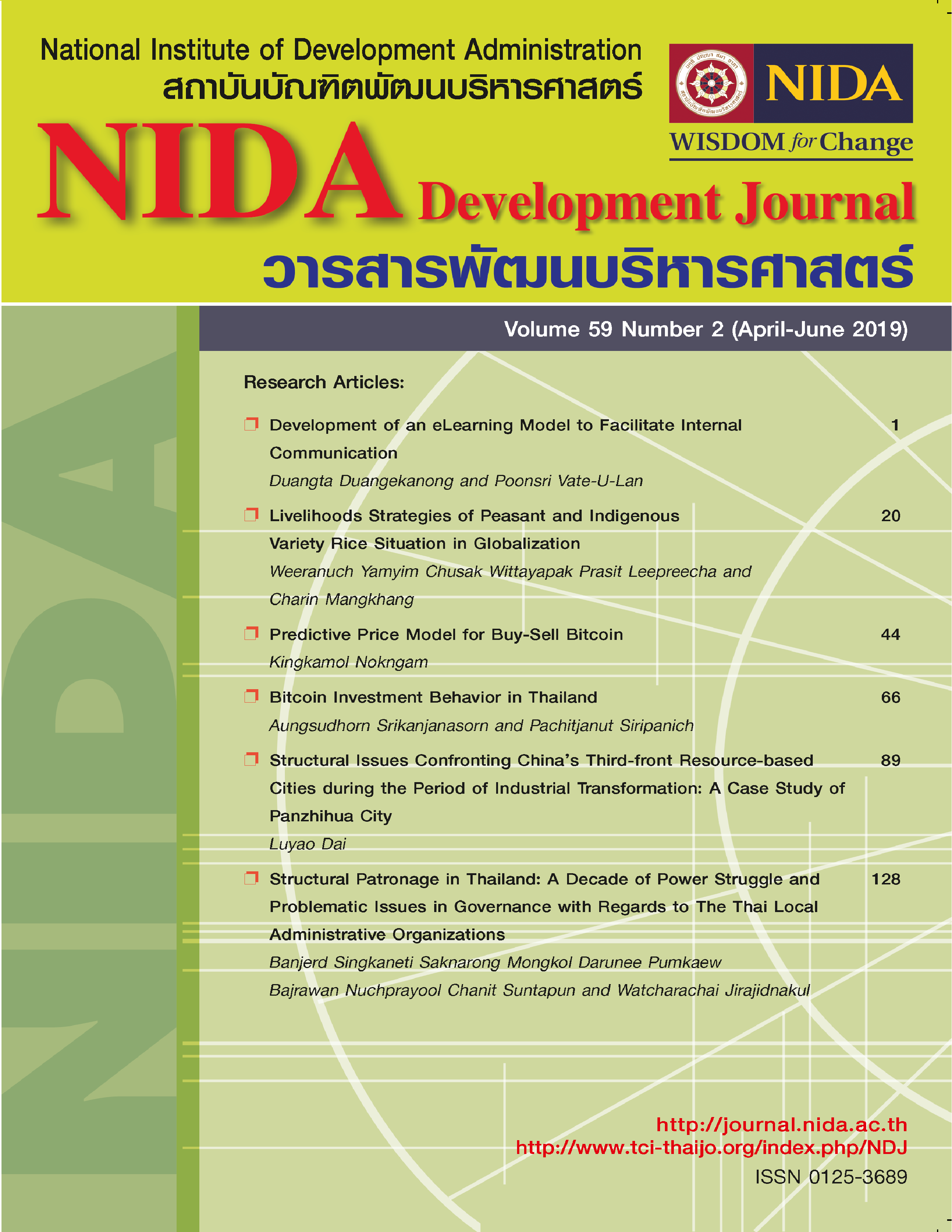Livelihoods Strategies of Peasant and Indigenous Variety Rice Situation in Globalization
Keywords:
Livelihoods Strategies, Peasant, Indigenous Rice Varieties, GlobalizationAbstract
This article intended to investigate the livelihoods of peasant and the situation of indigenous variety rice in globalization: a case study of Ban Nam Yen, Kok Saton Sub-District, Dan Sai District, Loei Province, Thailand on the issue that the reduction of indigenous rice varieties reflected to the food security and community culture. The results found that the indigenous rice varieties are cultivated for consumption and distribution in Ban Nam Yen. However, due to the economic conditions that come with a globalized society, farmers were forced to reduce the indigenous rice cultivation area and change the ways in which they used the land and how they cultivated the modified rice in the rice market. This meant that the use of indigenous rice variations were reduced - though there was an establishment of an indigenous rice peasant group. This has led to the transition from rice cultivation for private consumption to modern peasants in globalization society. All in all, this has devalued the indigenous rice and has caused Thai peasants to no longer be the foundation of Thai national identity. Instead, the reformed Thai economy has made Thailand a slave of commercial agriculture.
References
Chiengthong, Jamaree. (2018). Rural Society in Modern World. Faculty of Social Sciences, Chiang Mai University. Chiang Mai: Wanidakanpim.
Chanta, Satian. (2015). Indigenous Rice in Isaan: Local Wisdom and Resource Management of the peasant Community. Bangkok: KrungthepKanPim.
Ganjanapan, Anan. (2011). The Change of Social Structure in I-San Context: What have the local people adjusted? A Synthesis Research on Rural Economy of Isaan. Faculty of Social Sciences, Chiang Mai University. Chiang Mai: Chiang Mai University
Gladwin, C., Thomson, A., Peterson, J. and Anderson, A. (2001). Addressing food security in Africa via multiple livelihood strategies of women farmers. Food Policy. 26 (1):177–207.
Kollmair, M. and Gamper, S. (2002). “The Sustainable Livelihoods Approach”. Input Paper for The Integrated Training Course of NCCR North-South. Development Study Group: University of Zurich. https://pdfs.semanticscholar.org/05c5/9067287e8168324aee61478e15e487995fd0.pdf
Laungaramsri, Pinkaew. (2011). Livelihoods. Faculty of Social Sciences, Chiang Mai University. Chiang Mai: Pongsawaskanpim
Lianjamroon, Witoon. (2011). Agricultural Revolution for Food Security: The Analysis and the Practical Policies. Nonthaburi: Cheewaveethee Foundation.
Pintobtang, P. (2015). The changes in Political Economics in Rural Community and the Adjustment of Peasants. The Journal of Social Development, The Faculty of Social Development and Environmental Management, National Institute of Development Administration. 17(1): 29-63
Santasombat, Yos. (2003). Dynamics and Flexibility of Peasant Society: Northern Thailand Economy and the Paradigm Shift regarding the Third World Community. Chiang Mai: Within Design.
Sattayanurak, Attachak. (2017). From Rags to Riches: From Peasant to Entrepreneur. Bangkok: Mathichon.
Vandergeest, P. (2014). The Social Lives of Organic and the Politics of Food. in “The Social Life of Organic Farming and Politics in Food in Thailand” Rakyuttitham, A (Translated and Summarized). The Department of Social Sciences, Faculty of Arts, Silpakorn University and Yoowanaboon, N (Recorded) in The Journal of Sociology and Anthropology 33 (1): 179-184
Wittayapak, Chusak. (2015). Culture is Power, the Power Implementation, Identity and New Social Class in the Culture Space. Faculty of Social Sciences, Chiang Mai University. Chiang Mai: Wanidakanpim.
You, H and Zhang, X. (2017). Sustainable livelihoods and rural sustainability in China: Ecologically secure, economically efficient or socially equitable? Resources, Conservation and Recycling 120 (1): 1–13.
Downloads
Published
How to Cite
Issue
Section
License

This work is licensed under a Creative Commons Attribution-NonCommercial-NoDerivatives 4.0 International License.





